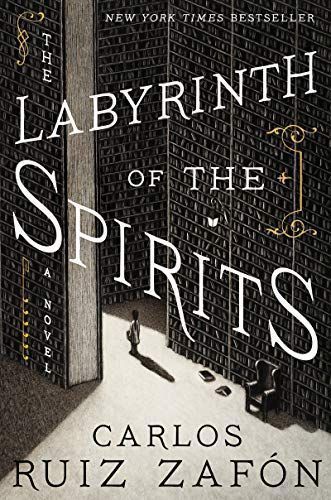
The Labyrinth of the Spirits From the bestselling author of The Shadow of the Wind
The long-awaited new novel from the author of the global bestseller and modern classic, The Shadow of the Wind. As a child, Daniel Sempere discovered among the passageways of the Cemetery of Forgotten Books an extraordinary novel that would change the course of his life. Now a young man in the Barcelona of the late 1950s, Daniel runs the Sempere & Sons bookshop and enjoys a seemingly fulfilling life with his loving wife and son. Yet the mystery surrounding the death of his mother continues to plague his soul despite the moving efforts of his wife Bea and his faithful friend Fermín to save him. Just when Daniel believes he is close to solving this enigma, a conspiracy more sinister than he could have imagined spreads its tentacles from the hellish regime. That is when Alicia Gris appears, a soul born out of the nightmare of the war. She is the one who will lead Daniel to the edge of the abyss and reveal the secret history of his family, although at a terrifying price. The Labyrinth of the Spirits is an electrifying tale of passion, intrigue and adventure. Within its haunting pages Carlos Ruiz Zafón masterfully weaves together plots and subplots in an intricate and intensely imagined homage to books, the art of storytelling and that magical bridge between literature and our lives. 'For the first time in 20 years or so as a book reviewer, I am tempted to dust off the old superlatives and event to employ some particularly vulgar clichés from the repertoire of publishers' blurbs. My colleagues may be shocked, but I don't care, I can't help myself, here goes. The Shadow of the Wind is a triumph of the storyteller's art. I couldn't put it down. Enchanting, hilarious and heartbreaking, this book will change your life. Carlos Ruiz Zafón has done that exceedingly rare thing - he has produced, in his first novel, a popular masterpiece, an instant classic' Daily Telegraph
Reviews
Shidehdeishidi@shideh
Arturo Hernández@artthh
Mary Garza@maryherondale
Andrea O. Ojeda@aooquery
Celeste Richardson@cecereadsandsings
Clara Moore@beingmybestshelf
Marloes@perfect-solitude
Omar@omareduardo
Nick Bicko@nember
Cath@cupsandthoughts
Maribel González@dosy22
Giada Arenare @jade_aries
Ben Nathan@benreadssff
Giulia @fcbgiulia
Alisha Raghavan @alisharaghavan
Alyssa C Smith@alyssacsmith
Lea@leawntz
Mai Sami@mai7
Sonia Flores@soniareads
Sandy@pdxhonzuki
Claudia Liz Poli@clizpoli
Mareike Heller@mareikehell
Laura Kurth@laaurakur
Alice@4l1c3
Highlights
Omar@omareduardo
Page 119
lola@lola7
Page 905
lola@lola7
Page 874
lola@lola7
Page 637
lola@lola7
Page 506
lola@lola7
Page 482